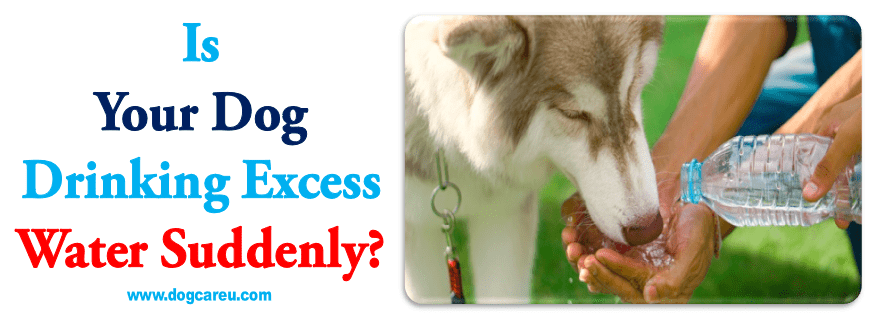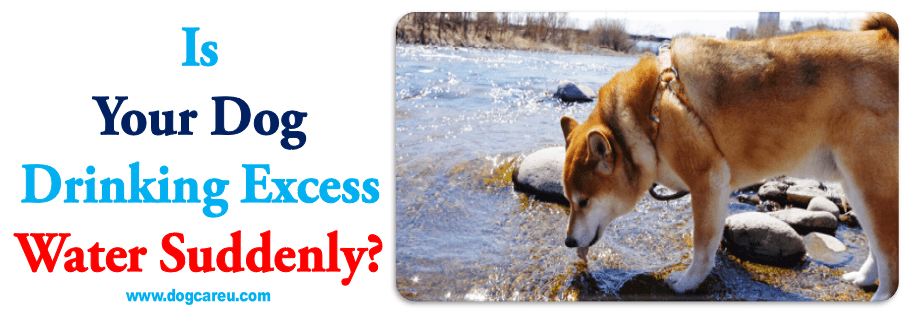Is Your Dog Drinking Excess Water Suddenly? A sudden increase in water intake in dogs may indicate an underlying health issue. We will explore possible reasons why your dog is drinking excessive amounts of water and when you should seek veterinary attention.
Increased thirst in dogs can be caused by various factors such as dehydration, heat, certain medications, kidney disease, diabetes, or even as a reaction to a change in diet. While some causes may be minor and easily resolved, others can be more serious and require prompt medical intervention.
It is important to monitor your dog’s behavior, consult with a veterinarian if necessary, and provide the necessary care to ensure your pet’s well-being.

Common Causes Of Excessive Water Drinking In Dogs
Dogs can be quite the water enthusiast, often lapping up water with reckless abandon. However, if your furry friend suddenly starts drinking lots of water, it may be cause for concern. Excessive water drinking in dogs, scientifically known as polydipsia, can indicate an underlying issue that needs attention. In this article, we will explore some of the common causes of excessive water drinking in dogs and shed some light on when you should seek veterinary advice.
Dehydration : Is Your Dog Drinking Excess Water Suddenly?
One possible reason for a dog’s sudden increase in water intake is dehydration. Dehydration can occur due to various factors such as excessive heat, strenuous activity, or illness. When dogs become dehydrated, their bodies naturally drive them to drink more water to compensate for the fluid loss.
Medical Conditions
Besides dehydration, several medical conditions can lead to excessive water drinking in dogs. These conditions may range from relatively mild to more serious, so it’s essential to keep an eye out for any accompanying symptoms. Some medical conditions that can cause increased water consumption include:
- Kidney disease
- Diabetes
- Hyperadrenocorticism (Cushing’s disease)
- Liver disease
- Urinary tract infection
- Hyperthyroidism
If you notice your dog drinking more water than usual and you suspect a medical condition, it is crucial to consult with a veterinarian. Early detection and treatment can significantly improve your dog’s prognosis.
Side Effects Of Medications
Another potential cause of increased water intake in dogs is the side effects of medications they may be taking. Certain medications can lead to an increase in thirst and subsequently more frequent drinking. If your dog has recently started a new medication, it’s worth considering whether this could be the culprit behind their sudden surge in water consumption.
While the above reasons are some of the more common causes of excessive water drinking in dogs, it’s important to remember that each dog is unique. If your dog’s sudden increase in water intake is accompanied by other concerning symptoms or behavior changes, it’s always best to consult with a veterinarian to rule out any underlying health issues.
Symptoms And Signs To Watch For
Keep an eye out for symptoms of excessive thirst in dogs, such as sudden and excessive drinking of water. It could be a sign of an underlying health issue that needs attention. Stay alert and consult a veterinarian if necessary.
Frequent Urination
Dogs are prone to occasional accidents in the house, but if you notice your furry friend constantly urinating, it may be a cause for concern. Frequent urination is one of the symptoms to watch for if your dog is drinking lots of water suddenly. A sudden increase in the frequency of urination can suggest an underlying health issue that requires attention.
Increased Thirst
An increased thirst in dogs can be indicative of various health conditions. If your dog is suddenly drinking excessive amounts of water, it could be a sign that something is not right. While it’s normal for dogs to drink more water after exercise or on hot days, a persistent and excessive thirst should not be ignored. Increased thirst can be a symptom of an underlying health problem such as kidney disease, diabetes, or even hormonal disorders.
Weight Loss
Weight loss in dogs can be a cause for concern, especially if it occurs suddenly or without any change in their diet or exercise routine. If your dog’s water intake has significantly increased and they are experiencing unexplained weight loss, it could be a sign of an underlying health condition. Weight loss, accompanied by polydipsia (excessive thirst), could be indicative of issues with their metabolism, digestive system, or even certain types of cancer.
It’s important to pay attention to these symptoms and signs in your dog’s behavior. While occasional increased thirst and urination can be normal, when it becomes excessive and is accompanied by weight loss, it may be time to consult your veterinarian. Early detection and proper diagnosis are crucial in maintaining your dog’s health and well-being.
Diagnosing The Underlying Issue
If your dog suddenly starts drinking excessive amounts of water, it may be a cause for concern. Excessive thirst, medically known as polydipsia, can indicate an underlying health issue that needs to be addressed. In order to identify the cause of your dog’s increased drinking, your veterinarian may need to conduct a thorough examination and perform certain tests. This will help determine whether your furry friend’s increased water consumption is due to a manageable condition or a more serious health problem.
Physical Examination
A physical examination allows the veterinarian to assess your dog’s overall health and look for any visible signs of illness. During this examination, the veterinarian will check your dog’s hydration level, measure its weight, and examine the mouth, nose, eyes, and skin for any abnormalities. Additionally, the vet may palpate the abdomen and listen to the heart and lungs using a stethoscope. These physical assessments can help the vet identify any underlying issues that could be causing your dog’s abnormal thirst.
Blood Tests
Blood tests are crucial in determining the cause of your dog’s excessive thirst. These tests, typically referred to as a complete blood count (CBC), provide valuable information about your dog’s overall health and can help identify underlying conditions such as diabetes, kidney disease, or hormonal imbalances. By analyzing the blood sample, the vet can assess various parameters including red blood cell count, white blood cell count, platelets, and certain enzyme levels. These results will assist the veterinarian in making an accurate diagnosis and crafting an appropriate treatment plan for your furry companion.
Urinalysis
Urinalysis, or the analysis of your dog’s urine, is another valuable diagnostic tool that can aid in identifying the cause of increased water intake. This test helps evaluate the concentration, pH, and specific gravity of the urine, as well as detect the presence of any bacteria, crystals, or blood. Additionally, urinalysis can provide insight into kidney function and detect the presence of certain substances that may be indicative of diabetes or urinary tract infections. By examining the urine, your veterinarian can gather important information to help narrow down the potential underlying issues causing your dog’s excessive water consumption.
Possible Treatment Options
If your dog suddenly starts drinking lots of water, it could be a sign of an underlying health issue. Possible treatment options include a visit to the veterinarian for a thorough examination and diagnostic tests to determine the cause and develop an appropriate treatment plan.
Fluid Therapy
One possible treatment option for a dog suddenly drinking lots of water is fluid therapy. This involves administering fluids to the dog to correct any imbalances or deficiencies that may be causing excessive thirst. Fluid therapy can be administered intravenously or subcutaneously, depending on the severity of the condition.
Medication
In some cases, medication may be prescribed to address the underlying cause of the excessive thirst. For example, if the increased water intake is due to a hormonal imbalance such as diabetes or Cushing’s disease, medications can be given to regulate the hormones and help manage the symptoms.
Dietary Changes
Making dietary changes can also be an effective treatment option for a dog experiencing excessive thirst. For instance, switching to a low-sodium diet can help regulate water intake and reduce the need for excessive drinking. Additionally, avoiding foods high in salt or additives can help prevent dehydration and further complications.
It’s important to note that these treatment options should be implemented under the guidance and supervision of a veterinarian. They will be able to assess the underlying cause of the sudden increase in water intake and recommend the most appropriate course of action. With timely intervention and proper treatment, it is possible to manage and improve the dog’s condition, ensuring their overall health and well-being.
Preventing And Managing Excessive Water Drinking
A sudden increase in water consumption in dogs can be a cause for concern. While occasional episodes of excessive drinking may not be concerning, persistent excessive water intake could indicate an underlying health issue. It is essential for pet owners to be aware of the potential causes of excessive water drinking and take preventive measures to maintain their dog’s overall health and well-being. In this article, we will discuss three essential aspects to prevent and manage excessive water drinking in dogs.
Proper Hydration
Proper hydration is crucial for our furry friends to maintain optimal health. Providing your dog with access to fresh and clean water throughout the day is vital. Make sure to check the water bowl regularly to ensure it is always filled. Additionally, if your dog spends a lot of time outdoors, especially during hot weather or physical activities, consider providing multiple water sources to avoid dehydration. Remember, access to water is especially important for dogs with a higher predisposition to dehydration, such as those with kidney issues or on certain medications.
Routine Veterinary Check-ups
Routine veterinary check-ups play a significant role in identifying and managing any underlying health concerns that may lead to excessive water drinking. Regular visits to your veterinarian will help detect early signs of potential health issues, including diabetes, kidney disease, or Cushing’s disease, which can cause increased thirst. Your veterinarian will perform a thorough examination, analyze blood work results, and provide tailored advice to ensure your dog’s well-being. Be sure to discuss any concerns or changes in your dog’s behavior, including increased water intake, during these visits.
Maintaining Healthy Diet And Exercise
Nutrition and exercise are fundamental to maintaining your dog’s overall health and preventing excessive water intake. Providing a balanced and healthy diet is essential, as some medical conditions and certain medications can increase thirst levels. Consult with your veterinarian to determine the most suitable diet for your dog’s specific needs. Alongside a healthy diet, regular exercise is vital to keep your dog active and stimulated. Daily physical activity and mental stimulation can help regulate your dog’s water intake and prevent excessive thirst.
Overall, preventing and managing excessive water drinking in dogs involves maintaining proper hydration, scheduling routine veterinary check-ups, and ensuring a healthy diet and exercise routine. By paying attention to these three crucial aspects, you can help identify and address any underlying health issues promptly, promoting a happy and healthy life for your furry friend.

Frequently Asked Questions Of Dog Drinking Lots Of Water Suddenly
Why Is My Dog Suddenly Drinking Lots Of Water?
It is possible that your dog is experiencing increased thirst due to various factors like hot weather, exercise, or an underlying medical condition.
What Are The Common Medical Reasons For Excessive Drinking In Dogs?
Some common medical reasons for excessive drinking in dogs include diabetes, kidney disease, urinary tract infection, Cushing’s disease, and certain medications.
Should I Be Concerned If My Dog Is Drinking More Water Than Usual?
Yes, it is important to monitor your dog’s water intake. If the increased drinking continues for more than a day or is accompanied by other symptoms, it is recommended to consult your veterinarian.
How Can I Help My Dog If It Is Drinking Excessive Water?
Ensure that your dog has access to fresh and clean water at all times. To rule out medical issues, consider scheduling a visit to the veterinarian for a thorough examination.
Can Excessive Drinking Of Water Be Prevented In Dogs?
While certain factors like weather and exercise cannot be prevented, maintaining a well-balanced diet, regular exercise, and routine veterinary check-ups can help identify and address any underlying health issues.
Conclusion
When your dog suddenly starts drinking a lot of water, it could be a sign of an underlying health issue. To ensure your dog’s well-being, it is crucial to monitor their water intake and consult with a veterinarian if necessary.
Remember, excessive thirst in dogs can indicate diabetes, kidney problems, or other medical conditions. Be attentive to your furry friend’s behavior and take proactive steps to maintain their health.


